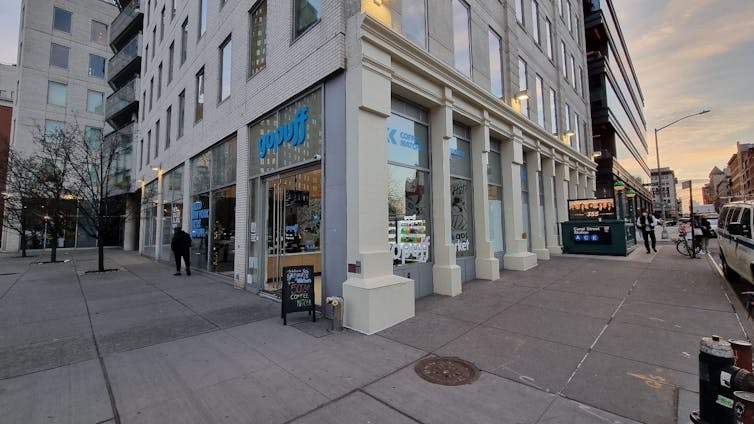How to republish
Read the original article in french and consult terms of republication.
Flink, Getir, Cajoo... “dark stores” and “quick commerce” are reshaping big cities

€129 billion. This is the amount of money the French spent online in 2021. It is more than twice the amount of 2014 (€57 billion).As for online food orders specifically, they account for almost €20 billion. Online food orders consist primarily of deliveries of meals and supermarket groceries. The fast or even “instant”delivery segment, sometimes called “quick commerce”, generated “only” €122 million in turnover in 2021 in France.Quick commerce is still a niche market, mainly reserved for large cities, but it nevertheless experienced a growth rate of 86% between 2020 and 2021. New players have emerged in Paris, London and New York. They include names such as Cajoo, Gorillas, Flink, Getir, JOKR and Gopuff, and their rapid expansion is making its mark on the urban landscape.
Organising ultra-fast deliveries requires storage and fulfilment facilities located in urban areas, within a radius of about two kilometres to reach the final customers. These small warehouses are set up like supermarkets, with a surface area of less than 400m2 and only accessible to the staff responsible for collecting and delivering the items. Hence their more common name: “dark store”.
A recent report by the Paris Urban Planning Agency (Apur), estimates that there were 80 dark stores in the French capital in January 2022. Amsterdam had approximately 28 in operation by mid-December 2021 and New York 110 by the end of February 2022.
The phenomenon is now quite visible, but far from the explosion sometimes mentioned in the press or by local politicians. The sector is also undergoing a process of consolidation, as evidenced by takeovers ((Frichti by Gorillas, for instance), by bankruptcies (Kol for example) and rapid market withdrawals.
Not the first
One of the effects of the pandemic was that it forced many retailers to expand their distribution channels, or at least to accelerate the changes that they had already put in motion. The lines between physical and digital spaces are blurring. With “click and collect”, many retailers are now having it both ways. They are called “omnichannel”.
Today, stores have become multifunctional hub, acting as showrooms, collection points, return centres, micro- storage units and micro-fulfilment centres.
As such, quick commerce did not invent dark stores, but is rather part of a retail model that was already changing before the Covid-19 crisis. Nor is it the first time that stores are being tested as fulfilment centres for local deliveries. French supermarket chain Monoprix has been operating a store-like warehouse in Paris since 2019. As its stores in office areas became empty during the first Covid lockdown in 2020, Franprix dedicated five of its stores to online orders, before reopening them again to the public.
The model actually has its origins in Asia. In China in particular, instant delivery of groceries has been an established consumer practice for over five years with companies such as Hema Fresh.
A developing business model that is called into question
The fact remains that, more than other retailers who use dark stores, quick commerce is struggling because of their uncoordinated integration in cities. Investors are pursuing a strategy known as “blitzscaling”. The strategy is all about racing for growth to gain an advantage over competitors. They want to be the biggest and they want to take as much market share as they can.
GetirGetir became the second unicorn of Turkish origin in all sectors. Brazilian company Daki achieved this status in only ten months of activity. Gorillas raised nearly $1 billion to finance its rapid expansion.
This “blitz” development nevertheless raises questions about the need to regulate this sector. Questions concern public space in the first place. How can we limit the nuisances caused to local residents by delivery workers’ driving and parking? How can we assess their impact on the overuse of cycling and road infrastructure?
The question is also commercial: are dark stores a threat to small retail stores or even to major retailers? Does the increase of these hidden, inaccessible spaces threaten urban life and vibrant streets as we know them? And legally, how should dark stores be considered, particularly with regard to local urban planning regulations: as commercial or as logistics spaces? Especially knowing that the hard laws of competition will likely cause the bankruptcy of the smallest stores, and therefore to leave spaces empty.
Cities’ counter-attacks
Some point out that dark stores are often set up, opportunistically, in former commercial premises in locations that have become increasingly undesirable. In London, for example, they are often established under railway arches, in light industrial parks and in the basements of shopping centres. In this way, abandoned spaces are sometimes given a second chance.
However, local authorities have expressed some concerns and are stepping up their efforts to regulate and even oppose their development. Some politicians even display a hostility that could be considered excessive, putting forward moralistic arguments and neglecting the fact that this offer responds to a consumer demand.
In March 2022, for example, the city of Paris decided to take legal action to close 45 of the 80 dark stores identified by the Apur. The argument they used was a failure to comply with local urban planning regulations. It also set up a procedure for citizens to report unauthorised warehouses in their neighbourhood. In the Netherlands, in Amsterdam and Rotterdam, a one-year moratorium on the opening of new dark stores was decided in January 2022.
Bypassing or cooperating
However, the means of regulating quick commerce remain fairly limited. Since the beginning of 2022, two trends have emerged for businesses. On the one hand, there is a willingness to adapt or even to work around the new local regulations. Getir, for example, is going to experiment with a click-and-collect service to have its warehouses classified as stores. Others are innovating and offering take-away sales of fresh products, such as GoPuff in New York, which launched GoPuff Market, combining a logistics space with a shop and a café.
On the other hand, there is a willingness to cooperate with local authorities. In Paris, the city council has also offered to help quick commerce companies like Cajoo to find suitable premises such as underground car parks.

The necessary regulation of quick commerce, in particular with regard to compliance with urban planning rules and the limitation of nuisances, should not, however, blind us from the fact that the sector is now just one more manifestation of the evolution of retail in cities. E-commerce have entered urban life and transformed consumer habits. Deliveries from physical stores, click-and-collect, pedestrian collection points and automatic lockers are other signs of these changes in the city. Moreover, the effects of dark stores on the local economic fabric should perhaps be put into perspective: Paris currently has fewer than one hundred dark stores for more than 60,000 retail businesses within the city.
To inform these debates, it is important to find ways to collect reliable data. There is a glaring gap here that the Logistics City Chair at Université Gustave Eiffel is trying to fill. For several weeks now, it has been engaged in counting and observation work in the French capital, particularly on the movements of delivery workers and vehicles. The aim is to put the organisation of sustainable urban logistics in all its dimensions on the local agenda and to rethink a rapidly evolving retail and logistics sector in cities.
Identity card of the article
| Original Title : | Flink, Gettir, Cajoo... "dark stores" and "quick commerce" are reshaping big cities |
| Authors : | |
| Publisher : | The Conversation France |
| Collection : | The Conversation France |
| License : | The original version of the article was published in French by The Conversation France under Creative Commons license. See the original article. An English version was created by Hancock & Hutton for Université Gustave Eiffel and was published by Reflexscience under the same license. |
| Date : | June 2nd, 2022 |
| Langages : | French and english |
| Keywords : | Regulation, Paris, competition, cities, uberisation, logistics, platforms, e-commerce, bankruptcy, business model, municipalities, delivery, precarious work, Covid-19 |

![[Translate to English:] Licence creative commons BY-SA 4.0 [Translate to English:] Licence creative commons BY-SA 4.0](https://reflexscience.univ-gustave-eiffel.fr/fileadmin/ReflexScience/Accueil/Logos/CCbySA.png)